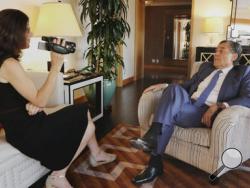NEW YORK (AP) — As she sat overlooking a hotel lobby in Philadelphia during the Democratic National Convention this week, Alexandra Pelosi said she spied three of the wealthy men featured in her HBO documentary, "Meet the Donors: Does Money Talk?"
For her sake, it's fortunate that the film premieres Monday (9 p.m. EDT), presumably after everyone has left town.
"I think they expected me to come to them and say they could vet this, and I didn't do that," Pelosi said. "So now all that I'm doing is hiding behind bushes."
Pelosi, best known for her 2002 fly-on-the-wall "Journeys With George" documentary about George W. Bush's first presidential campaign, takes us into the fundraisers to meet the people who write big checks for the people who run for president. She deals in a limited way with the corrosive impact of special-interest spending on government action, but wanted to stay mostly out of Washington and to make sure the story wasn't boring.
"This is not a PowerPoint presentation that will be presented at a Harvard review of campaign finance reform," she said. "This is an HBO documentary for a Monday night, when you're competing against 'Undercover Boss.'"
Many of the big donors wouldn't talk to Pelosi. But a surprising number did. Pelosi, daughter of House Democratic leader Nancy Pelosi, already knew many of them from accompanying mom on the canape circuit. Some wanted to demystify the process, annoyed at being vilified as the "billionaire class" by Bernie Sanders, and suggest their influence is exaggerated.
The point was made to comical effect by Brad Freeman, who has given more than a million dollars to the Bush family. He got a call from George W. Bush shortly after he was elected, and visions of grandeur danced in his head; Freeman dreamed of a chance to run the C.I.A. Instead, the conversation turned to Bush's cat, which Freeman had taken a liking to. Bush couldn't bring the cat to the White House. Would Freeman want it?
When people wonder what he got in return for his donations, Freeman says ruefully, "I got the frickin' cat."
What's almost sad is the revelation of how much life is like high school, even in the high-rent district.
Elizabeth Bagley, a donor whose loyalty to the Clintons earned her an ambassadorship to Portugal, proudly displays framed pictures of herself with Bill and Hillary. "Elizabeth — you're the best! Love, Hillary," was inscribed on one. A cardiologist, Bruce Charash, also exhibits photos of himself with politicians including President Barack Obama.
"The more you have pictures of powerful people in your office," he says, "the more powerful people think you are."
Billionaire grocery magnate John Catsimatidis talks about wanting to "pee with the big dogs." He gives to candidates from both parties. "I want to be in a position where I make a call, it will be picked up," he says.
"There are a lot of rich people who aren't the most interesting people," Pelosi said. "This is a way of buying friends, of getting people to show up at your parties."
Many donors have strong feelings about issues and want to be listened to. Pelosi talks to broadcasting executive Stanley Hubbard, her first boss, a conservative who rails about "too many tree-hugging fruitcakes" and dismisses global warming.
"I have never, ever called a politician for help," Hubbard tells her. "But yes, I can get in to talk to him. I get access."
Donors who host fundraising parties often get the same stump speeches a candidate gives publicly. For the most part, the donations pay for commercials that are effectively canceled out by ads another rich person buys for an opponent. "Maybe the donors are suckers," Pelosi said. "If you want to see a candidate, you go to a diner in Iowa or New Hampshire and see them for free."
But don't be naive. Billionaire T. Boone Pickens believes his funding of the Swift Boat commercials against John Kerry in 2004 was a significant factor in Bush's re-election. He also thinks that natural gas legislation he supported failed not because of its merit, but because the deep-pocketed Koch brothers were able to spend more than him to oppose it.
Pelosi also profiles people like Vin Ryan, disgusted by democracy's turn. He's taking the seemingly contradictory stance of only spending money on behalf of candidates who support efforts to reduce the influence of money in politics.
Her concluding point: if there's a way to get some of the money out of politics, perhaps it would bring more voters in.
___
Online: http://www.hbo.com/documentaries/meet-the-donors-does-money-talk/
Keep track on how much Clinton and Trump are spending on television advertising, and where they're spending it, via AP's interactive ad tracker. http://elections.ap.org/content/ad-spending .

